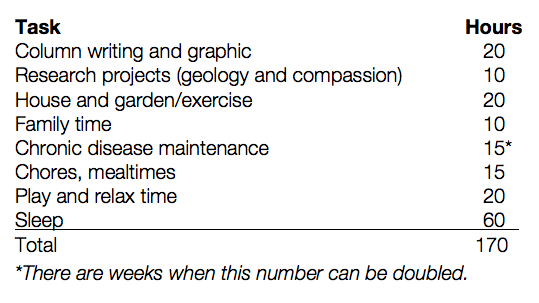APRIL 26, 2019 BY DR. C IN COLUMNS
I thought that when I retired, I would have more time, not less. How did life get so busy? There are not enough hours in the week to finish all the things I want to. If I push myself harder and longer, then I get fatigued and overwhelmed, but then I need more rest, which results in less time. That thwarts the desired outcome.
I have a long to-do list, and I feel oppressed just looking at it, particularly when I am already worn out. I have been fighting this battle for the past five years, and there are a few things that make it a little easier for me.
To give you some idea of what my seven-day week looks like, here is my to-do list, with the average number of hours spent on each task:
A seven-day week has 168 available hours. I am already overbooked, and I haven’t included several projects that are on my waiting-to-do list. These include finishing/publishing three manuscripts, finishing/publishing my graphic novel, and a blog that hasn’t had a new post in over a year.
There is “Santa,” an important part of my identity, which will consume most of my time in December. Finally, there are requests for my professional services, such as a paper or a presentation. When these requests come in, something on the above list must change, and it can be too much.
The emotional confusion of being overwhelmed puts a halt to effective project engagement. The way out of being so damn busy and feeling weighed down is to put into place some form of a time management system. The first thing is to realize how much time your chronic disease consumes each week. There are lots of ways this happens, and flexibility is crucial to coping.
The second thing is to set aside the time needed for things that add to your well-being, like sleep, exercise, meals, and family. If you are like me, with lots of irons in the fire, you have a full list of things that require your time. It comes down to making choices, setting priorities. Sometimes, we have to say no to people.
Time is a resource that can be thought of like money. There is a limited “time budget” to spend, and I want to allocate that time in the best way possible in order to get the most out of this life with a chronic disease. I spend time in concentrated blocks of three to four hours. This helps to avoid distractions. Also, these blocks can be reallocated when something unexpected comes up — something always does!
Delegation, when appropriate, is a good time-management strategy. My partner has taken on the email, social networking, and the appointment calendar, which frees up time.
There are resources to help with time management skills. Here are a few:
1. A time management skills
book that looks at multiple life demands on our time
2. A 30-minute
audiobook talk with clear tips on time management
What issues do you face with not having enough time in the week to get everything done?
***
Note: Parkinson’s News Today is strictly a news and information website about the disease. It does not provide medical advice, diagnosis or treatment. This content is not intended to be a substitute for professional medical advice, diagnosis, or treatment. Always seek the advice of your physician or another qualified health provider with any questions you may have regarding a medical condition. Never disregard professional medical advice or delay in seeking it because of something you have read on this website. The opinions expressed in this column are not those of Parkinson’s News Today or its parent company, BioNews Services, and are intended to spark discussion about issues pertaining to Parkinson’s disease.
https://parkinsonsnewstoday.com/2019/04/26/busy-life-overwhelmed-time-management/



No comments:
Post a Comment